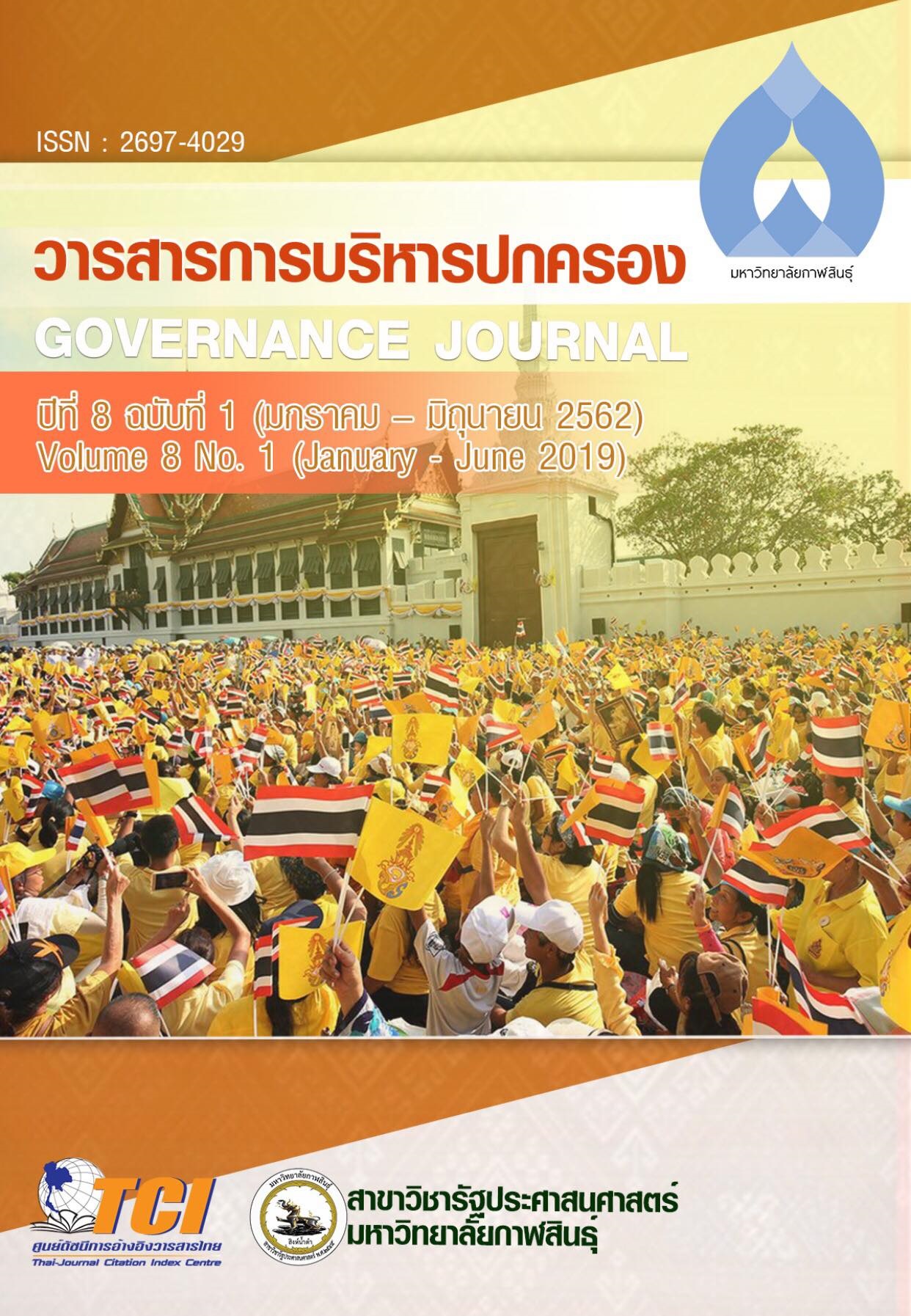Green Hotel Management Model for Creating Competitive Advantage in Thailand
DOI:
https://doi.org/10.14456/gjl.2019.24Keywords:
Management, Green Hotel, Competitive AdvantageAbstract
Abstract
The mixed method research aims to study about levels of management, green marketing, service quality, and competitive advantages of Green Hotel in Thailand, and creating and affirming the green hotel management model to build up the competitive advantages in Thailand. The result of the research shows that 1) the level of the green hotel management received a high average. The factor with the highest average score was the environmental friendly service 2) the green marketing level received a very high average. The factor with the highest average score was distribution 3) the level of service quality received a high average. The factor with the highest average score was reliability. 4) the level of competitive advantage received a high average. The factor with the highest average score was leadership in the market. 5) the creation of the green hotel management model to build up the competitive advantages in Thailand through the consideration of the independent and dependent variables that contribute to the competitive advantages of the green hotel management can be categorized into 2 groups; main factors and secondary factors. The main factors were price, procurement, and the environmental and energy management. The secondary factor were community participation, products, public relation, distribution and service.
Downloads
References
กรมส่งเสริมคุณภาพสิ่งแวดล้อม. (2559). เอกสารโครงการส่งเสริมการมีส่วนร่วม
ของสถานประกอบการในการบริการที่เป็นมิตรกับสิ่งแวดล้อมประเภทโรงแรม (Green Hotel). กรุงเทพฯ : กรมส่งเสริมคุณภาพสิ่งแวดล้อม.
ขวัญฤดี โซติชนาทวีวงค์. (2555). จัดซื้อจัดจ้างที่เป็นมิตรต่อสิ่งแวดล้อม. นนทบุรี :
องค์กรธุรกิจเพื่อการพัฒนาอย่างยั่งยืน.
ฐิตินันท์ ทองสาด (2556). กลยุทธ์ความได้เปรียบทางการแข่งขนและการดำเนิน
กิจกรรมความรับผิดชอบทางสังคมต่อผู้ประกอบการธุรกิจ รีสอร์ทอำเภอ
แก่งกระจาน จังหวัดเพชรบุรี. วิทยานิพนธ์บริหารธุรกิจมหาบัณฑิต มหาวิทยาลัยศิลปากร.
ธัญปวีณ์ รัตน์พงศ์พร (2553). แบบจำลองพฤติกรรมการซื้อผลิตภัณฑ์ที่เป็นมิตรต่อ
สิ่งแวดล้อมของผู้บริโภค. วิทยานิพนธ์ ปรัชญาดุษฎีบัณฑิต มหาวิทยาลัย
รามคำแหง.
ธีรกิติ นวรัตน์ ณ อยุธยา. (2557). การตลาดบริการแนวคิดและกลยุทธ์.
(ฉบับปรับปรุง). กรุงเทพฯ : จุฬาลงกรณ์มหาวิทยาลัย.
ธีระ ขุนแผ้ว. (2560). สัมมนาการตลาด. สืบค้นเมื่อวันที่ 16 กุมภาพันธ์2560. จาก
http://www.e-leaning.tapee.ac.th.
นิศาชล ลีรัตนากร. (2556). รูปแบบการบริโภคสีเขียว ของผู้บริโภคจังหวัด
เชียงใหม่. เชียงใหม่ : มหาวิทยาลัยแม่โจ้.
ศุภณัฐ ชูชินปราการ. (2549). การวิเคราะห์สถานการณ์ทางการตลาด. วารสารมการ
วิเคราะห์, 10 (68) : 59-61.
สันทนา อมรไชย. (2552). ผลิตภัณฑ์สีเขียวเพื่อสิ่งแวดล้อมที่ยั่งยืน. วารสารกรม
วิทยาศาสตร์บริการ, 57 (179) 29-36 ; มกราคม 2552.
สำนักหอสมุดและศูนย์สารสนเทศวิทยาศาสตร์และเทคโนโลยี. (2553). ผลิตภัณฑ์สี
เขียวเพื่อสิ่งแวดล้อม (Green Products). กรุงเทพฯ : กรมวิทยาศาสตร์
บริการ กระทรวงวิทยาศาสตร์และเทคโนโลยี
สุนทรพจน์ ดำรงพานิช. (2555). โปรแกรม Mplus กับการวิเคราะห์ข้อมูลทาง
พฤติกรรมศาสตร์และสังคมศาสตร์. มหาสารคาม : มหาวิทยาลัย
มหาสารคาม.
สุพานี สกฤษฏ์วานิช. (2553). การบริหารเชิงกลยุทธ์. กรุงเทพฯ :
มหาวิทยาลัยธรรมศาสตร์.
เสนาะ ติเยาว์. (2549). ความได้เปรียบทางด้านต้นทุน. สืบค้นเมื่อวันที่ 8 มีนาคม
2560. จาก http://www. dld.go.th.
หงสกุล เมสนุกูล. (2555). การศึกษาแนวทางการจัดการสิ่งแวดล้อมของธุรกิจที่พัก
ตามมาตรฐานโรงแรมใบไม้สีเขียวของซิกเซ้นส์ ไฮอเวย์ เกาะยาวน้อย
จังหวัดภูเก็ต. กรุงเทพฯ :มหาวิทยาลัยเกษตรศาสตร์ วิทยาเขตกำแพงแสน.
Tatreviewmagazine. (2559). แนวทางปฏิรูปประเทศไทย. สืบค้นเมื่อวันที่ 11
ธันวาคม 2559. จาก www.tatreviewmagazine.com
Thansettakij. (2559). รายได้ธุรกิจโรงแรม. สืบค้นเมื่อวันที่ 15 สิงหาคม 2559.
จาก www.thansettakij.com.
Manaktola, K., Jauhari, V., 2007. Exploring consumer attitude and
behaviour towards Green practices in the lodging industry in
India. International Journal of ContemporaryHospitality
Management. 19 (5), 364–377.
Parasuraman, A., Berry, L.L., & Zeithaml, V.A. (1985). A Conceptual
Model of ServiceQuality and Its Implications for Future Research.
Journal of Marketing, 49 (1), 41-50.
Porter, M.E. (1990). Competitive Strategy : Techniques for Analyzing
Industries and Competitors. New York : Free.
Yinixg (Lixa) Gao, Anna S. Mattila. (2014). Improving consumer
satisfaction in green hotels : The roles of perceived warmth,
perceived competence, and CSR motive. International Journal
of HospitalityManagement . 42,1-202 ; September 2014.
Translated Thai References
Amornchai, S. (2009). Green products for a sustainable environment.
Journal of the Department of Science Service. 57 (179) 29-36.
Bureau of Science and Technology Information and Technology Library.
(2010). Green products for the environment (Green
Products). Bangkok: Department of Science Service Ministy of Science and Tecnology
Chuchanrakarn, S. (2006). Marketing situation analysis. Journal of
Analysis, 10 (68): 59-61.
Department of Environmental Quality. (2016). Project documents for
promoting the participation of enterprises in
environmentally friendly services for hotels (Green
Hotel) Bangkok: Department of Environmental Quality
Promotion.
Khunchua, T. (2560). Marketing seminar. Searched on 16 February
2017. From http://www.e-leaning.tapee.ac.th.
Leeratanakorn, N. (2013). Green consumption patterns Of consumers
in Chiang Mai Province. Chiang Mai: Maejo University.
Nawarat Na Ayudhaya, T. (2014). Marketing services, concepts and
strategies. (Revised edition). Bangkok: Chulalongkorn University.
Nusukul, H. (2012). Study of environmental management guidelines
of accommodation business according to the Green Leaf Hotel standards of Six Senses Hideaway, Koh Yao Noi, Phuket Province. Bangkok: Kasetsart University
Kamphaeng Saen Campus.
Phongphon, T. (2010). Consumer behavior buying model of
environmentally friendly products. Thesis of Doctor of
Philosophy, Ramkhamhaeng university.
Sakritwanich, S. (2010). Strategic management. Bangkok: Thammasat
University.
Sotitthaweewong, K. (2012). Eco-friendly procurement. Nonthaburi:
Business organization for sustainable development.
Speeches for the Commercialization (2012). Mplus program with
behavioral and social science data analysis. Mahasarakham:
Mahasarakham University.
Tatreviewmagazine. (2016). Thailand Reform Guidelines. Searched on
11 December 2016. From www.tatreviewmagazine.com
Thansettakij. (2016). Hotel business income. Searched on 15 August
2016. From www.thansettakij.com.
Thongplad, T. (2013). Strategies for competitive advantage and
implementation of social responsibility activities for business operators Resort, Kaeng Krachan District Phetchaburi Province. Thesis of Master of Business Administration, Silpakorn University.
Young, S. (2006). Cost advantage. Searched on 8 March 2017. From
http: // www. Dld.go.th.
Downloads
Published
How to Cite
Issue
Section
License

This work is licensed under a Creative Commons Attribution-NonCommercial-NoDerivatives 4.0 International License.








